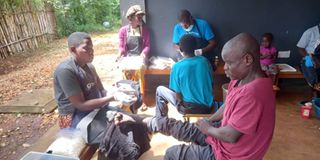Bugisu surpasses Busoga in jigger infestations – report

Social workers at Sole Hope Kyabirwa Clinic in Jinja City attend to patients infested with jiggers on Saturday. PHOTO | ABUBAKER KIRUNDA
What you need to know:
- Jigger infections used to be an endless menace in the Busoga sub-region, with reports of deaths in almost all its districts.
Bugisu sub-region has surpassed Busoga in jigger jigger infestations, according to a report by Sole Hope Uganda, a Non-Governmental Organisation handling Neglected Tropical Diseases (NTDs), with a focus on jiggers.
Jigger infections used to be an endless menace in the Busoga sub-region, with reports of deaths in almost all its districts.
The issue once elicited debate in 2008 when a family of five was admitted to Kakira Health Centre in Jinja district.
At the time, Parliamentarians considered the possibility of arresting people infested with jigger fleas, arguing that they were “flouting public health laws”.
Ms Joyce Yokobis, the Head of Human Resource at Sole Hope Uganda, says that last year, the person with the highest number of jiggers was found in the Bugisu sub-region.
“Many of the patients we have in our clinic are from the Bugisu area, but I can tell you that one of them had 2,00 jiggers compared to a patient from Busoga with 20 jiggers,” she said at the weekend.
She added that the Busoga Sub-region used to have a high number of patients with jiggers, but for the past five years, the problem has shifted to the Bugisu sub-region.
She cited Sironko, Bududa, Manafwa and Namisindwa districts as being the most affected, adding that people in these districts live in hard-to-reach, mountainous areas, where access to water for bathing is hard.
She said: “Water sources in these areas are far and if one gets a jerry can of water, it is not easy to use it for bathing and jiggers survive in a dirty environment, which in this case is their unwashed body.”
The organisation's Country Directory, Ms Josephine Karumira, said poverty is high among communities in the Bugisu sub-region; therefore, it is not easy for residents to buy soap for bathing, while others take jiggers as a “family problem”.
“When we reach out to pick infected people, some of them do not want to go for treatment in our clinics because they feel like jiggers are inborn,’’ Ms Karumira said, adding that about 500 people from this region are being treated for jiggers.
According to Ms Karumira, formal documents requesting for treatment of these people are worked out with district authorities before getting in touch with patients.
Ms Karumira says the Offices of the Chief Administrative Officers of different districts are approached and agreements signed before taking away patients for treatment in different clinics.
She adds that the organisation has trained some nurses at government health centres in these districts to work on minor infections, while those with severe infections are transported to the organisation’s main clinic in Kyabirwa, Jinja City for treatment.
Currently, she says, an average of 30 patients with severe cases are admitted to the clinic for treatment every month, with each spending about Shs600,000 on treatment over two weeks.
Ms Karumira says some patients become “mentally disturbed”, and “emaciated” and start talking incoherently when severely attacked by jiggers.
She warned that in extreme conditions, jiggers kill although such an incident has never happened at the facility.
Ms Karumira, however, notes that the problem of jiggers in Bugisu sub-region is high among children.
Mr Paul Koko, a resident of Kiroba Village, Bukibino Sub-county, Bududa district, who was found in the patients’ ward, said jiggers had attacked all members of his family, and that he had also refused to come for treatment, thinking the problem was inborn.
The Sironko District Health Officer, Dr Paul Wakoko, confirmed the existence of jiggers in the area but was quick to downplay the threat as not alarming.
“There are indeed jiggers in my district, but in a few isolated Sub-counties which I think we can manage,” he said adding that over-consumption of alcohol and poor hygiene made residents prone to suffering from jiggers.
The Bududa District Health Officer, Ms Imelda Tumuhairwe, said she was on leave and could neither confirm nor deny the existence of jiggers in the district.




